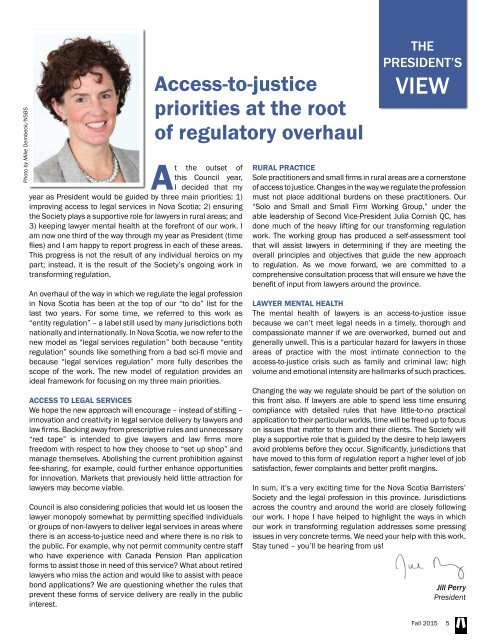Restoring Justice
1OTNXPx
1OTNXPx
Create successful ePaper yourself
Turn your PDF publications into a flip-book with our unique Google optimized e-Paper software.
Photo by Mike Dembeck/NSBS<br />
At the outset of<br />
this Council year,<br />
I decided that my<br />
year as President would be guided by three main priorities: 1)<br />
improving access to legal services in Nova Scotia; 2) ensuring<br />
the Society plays a supportive role for lawyers in rural areas; and<br />
3) keeping lawyer mental health at the forefront of our work. I<br />
am now one third of the way through my year as President (time<br />
flies) and I am happy to report progress in each of these areas.<br />
This progress is not the result of any individual heroics on my<br />
part; instead, it is the result of the Society’s ongoing work in<br />
transforming regulation.<br />
An overhaul of the way in which we regulate the legal profession<br />
in Nova Scotia has been at the top of our “to do” list for the<br />
last two years. For some time, we referred to this work as<br />
“entity regulation” – a label still used by many jurisdictions both<br />
nationally and internationally. In Nova Scotia, we now refer to the<br />
new model as “legal services regulation” both because “entity<br />
regulation” sounds like something from a bad sci-fi movie and<br />
because “legal services regulation” more fully describes the<br />
scope of the work. The new model of regulation provides an<br />
ideal framework for focusing on my three main priorities.<br />
Access to legal services<br />
We hope the new approach will encourage – instead of stifling –<br />
innovation and creativity in legal service delivery by lawyers and<br />
law firms. Backing away from prescriptive rules and unnecessary<br />
“red tape” is intended to give lawyers and law firms more<br />
freedom with respect to how they choose to “set up shop” and<br />
manage themselves. Abolishing the current prohibition against<br />
fee-sharing, for example, could further enhance opportunities<br />
for innovation. Markets that previously held little attraction for<br />
lawyers may become viable.<br />
Council is also considering policies that would let us loosen the<br />
lawyer monopoly somewhat by permitting specified individuals<br />
or groups of non-lawyers to deliver legal services in areas where<br />
there is an access-to-justice need and where there is no risk to<br />
the public. For example, why not permit community centre staff<br />
who have experience with Canada Pension Plan application<br />
forms to assist those in need of this service? What about retired<br />
lawyers who miss the action and would like to assist with peace<br />
bond applications? We are questioning whether the rules that<br />
prevent these forms of service delivery are really in the public<br />
interest.<br />
Access-to-justice<br />
priorities at the root<br />
of regulatory overhaul<br />
the<br />
president’s<br />
view<br />
Rural practice<br />
Sole practitioners and small firms in rural areas are a cornerstone<br />
of access to justice. Changes in the way we regulate the profession<br />
must not place additional burdens on these practitioners. Our<br />
“Solo and Small and Small Firm Working Group,” under the<br />
able leadership of Second Vice-President Julia Cornish QC, has<br />
done much of the heavy lifting for our transforming regulation<br />
work. The working group has produced a self-assessment tool<br />
that will assist lawyers in determining if they are meeting the<br />
overall principles and objectives that guide the new approach<br />
to regulation. As we move forward, we are committed to a<br />
comprehensive consultation process that will ensure we have the<br />
benefit of input from lawyers around the province.<br />
Lawyer mental health<br />
The mental health of lawyers is an access-to-justice issue<br />
because we can’t meet legal needs in a timely, thorough and<br />
compassionate manner if we are overworked, burned out and<br />
generally unwell. This is a particular hazard for lawyers in those<br />
areas of practice with the most intimate connection to the<br />
access-to-justice crisis such as family and criminal law; high<br />
volume and emotional intensity are hallmarks of such practices.<br />
Changing the way we regulate should be part of the solution on<br />
this front also. If lawyers are able to spend less time ensuring<br />
compliance with detailed rules that have little-to-no practical<br />
application to their particular worlds, time will be freed up to focus<br />
on issues that matter to them and their clients. The Society will<br />
play a supportive role that is guided by the desire to help lawyers<br />
avoid problems before they occur. Significantly, jurisdictions that<br />
have moved to this form of regulation report a higher level of job<br />
satisfaction, fewer complaints and better profit margins.<br />
In sum, it’s a very exciting time for the Nova Scotia Barristers’<br />
Society and the legal profession in this province. Jurisdictions<br />
across the country and around the world are closely following<br />
our work. I hope I have helped to highlight the ways in which<br />
our work in transforming regulation addresses some pressing<br />
issues in very concrete terms. We need your help with this work.<br />
Stay tuned – you’ll be hearing from us!<br />
Jill Perry<br />
President<br />
Fall 2015 5


